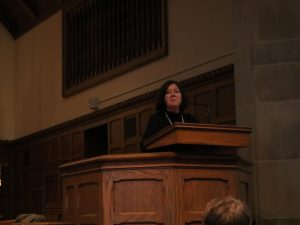Pro of Mary Badham
March 2, 2018
Mary Badham’s speech was meant to highlight the relevance of To Kill a Mockingbird in today’s society. A goal which was accomplished well in spite of the unwarranted outrage her words sparked.
Many were upset about how “political” Badham was and expected her to just speak about the book; however, if they had listened to what the grant that brought Badham to Darlington was really about they might not have been so surprised.
The grant proposal reads as this:
Cultivating empathy and seeking different cultural perspectives are two important components of Darlington’s Portrait of a Graduate, and the grant’s proposal was to impart opportunities for Darlington’s faculty and students to enrich themselves and grapple with the following questions: How do we impart tolerance or empathy and the courage to learn and embrace other cultures if we have not personally embraced these characteristics ourselves? And if we have embraced them, are we purposeful in our applications? Do we have the courage to discuss topics that make us uncomfortable or that we do not understand? Do we have the conviction to follow our dreams even when the journey is hard or risky? Are we tolerant and listen to others’ ideas while not pre-judging them? Or, are we authoritarians in our classrooms; do we censure different thought and opinions; and do we shy away from troublesome topics? Are we able to admit when we don’t know the answer to a question, or when we are not qualified to speak of an experience that we have not had?
Badham’s speech has proven just how much we needed her speech. Many students are unwilling to even entertain what she had to say simply because they disagree with her or feel she crossed a line. We cannot tune out opposing beliefs simply because we disagree with them.
This was never about literature or movies. Badham was brought in to talk about how the themes of To Kill a Mockingbird are still relevant today. If you need a refresher on the themes of To Kill a Mockingbird, here is Shmoop’s list. Topping the list is racism.
Racism is still around and still has a much louder voice in our government than it should. This is what Badham came to talk about. She came to tell us how we could learn from Scout, Jem and Atticus and begin to heal our broken nation.
Badham’s interest is in “expanding knowledge about the film’s message of social injustice and to insure that each generation of students can experience the film’s impact.” She has been quoted saying, “This is not a black-and-white 1930s issue, this is a global issue. Racism and bigotry haven’t gone anywhere. Ignorance hasn’t gone anywhere.”
Racism is not dead, and it is up to us to fix it. And we start fixing it by exposing ourselves to cultures that are different than our own. So, as the grant says, we must find the “courage to learn and embrace other cultures” and be “tolerant to others’ ideas without pre-judging them.”
One of the most recognizable quotes from To Kill a Mockingbird is probably, “You never really understand a person until you consider things from his point of view…until you climb in his skin and walk around in it.” This is what we must all do. We must take the time to familiarize ourselves with the views, values and beliefs of others in order to fix societal problems and injustices that plague our world today.
Being exposed to others’ opinions isn’t “indoctrination,” as I have heard used too many times to count over the past several days; it’s life.
It is only through discourse that we learn. As Badham said, “Ignorance is the root of all evil” and “Education is the key to freedom.”





